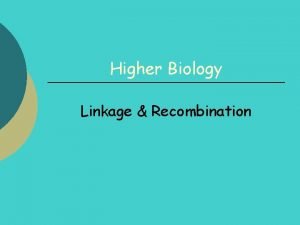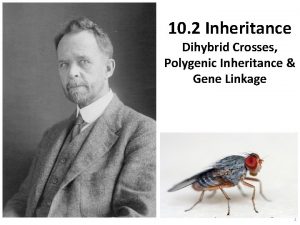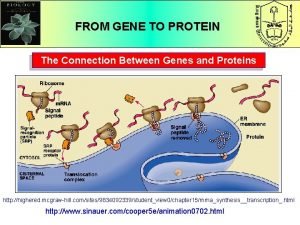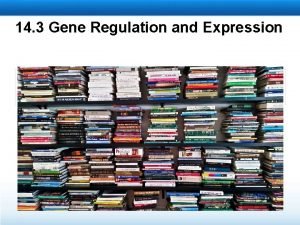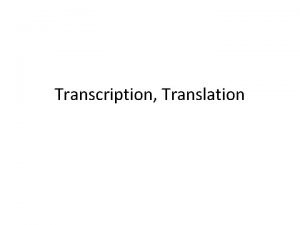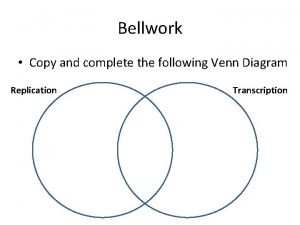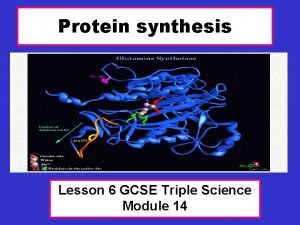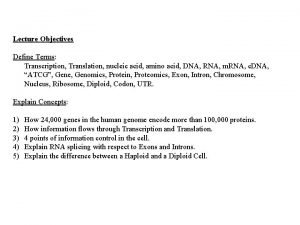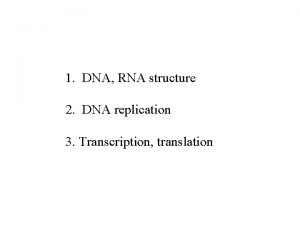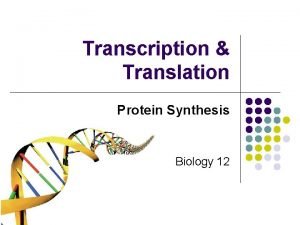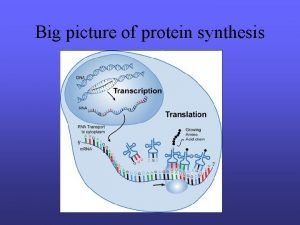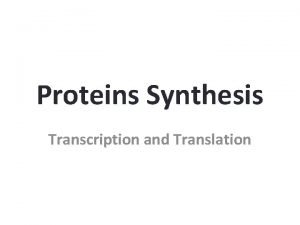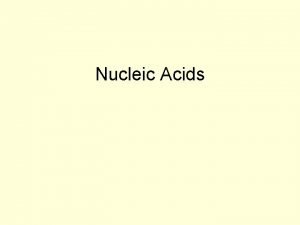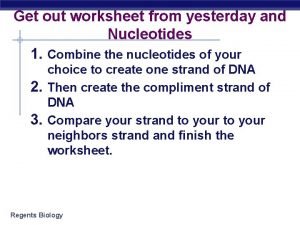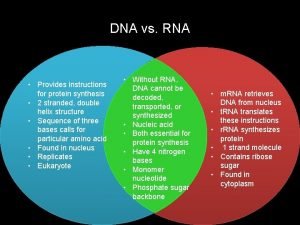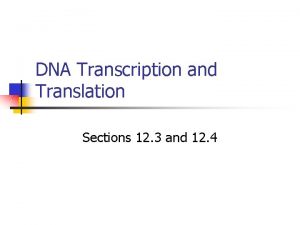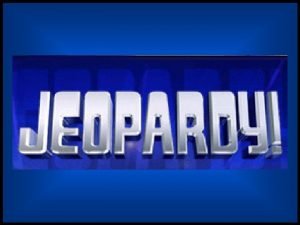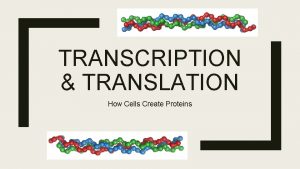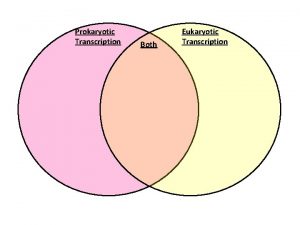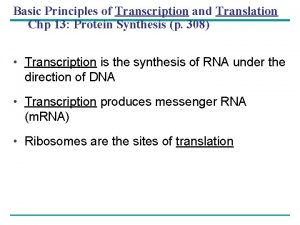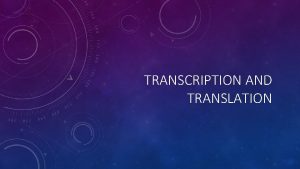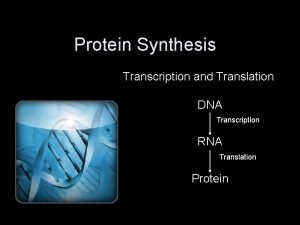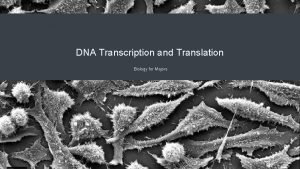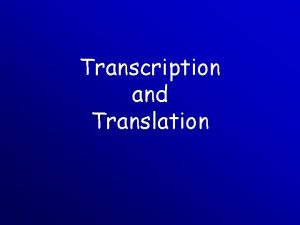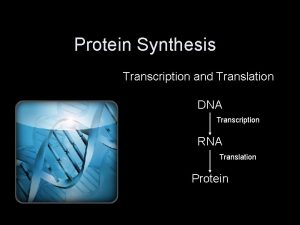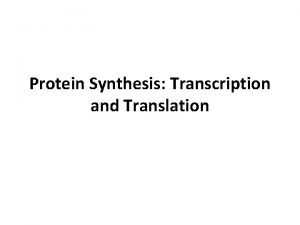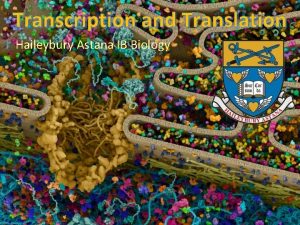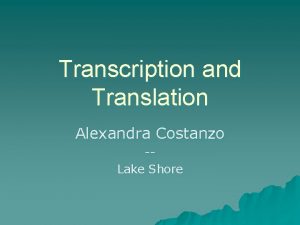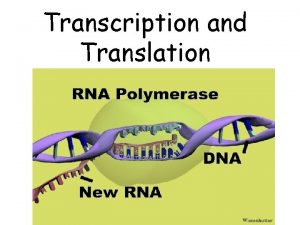Chp 12 Transcription Translation Genes and Proteins Proteins
















- Slides: 16

Chp: 12 Transcription & Translation

Genes and Proteins § Proteins function as Enzymes, build and repair cells, transport proteins § Genes code for proteins (genetic code) § Proteins are built from amino acids § Each nucleotide is composed of 3 nitrogen bases representing an amino acid called a codon

§ There are 64 different codons in the genetic code § Genetic code was figured out by studying E. coli. § Codons represent the same amino acids in all organisms.

Transcription § RNA differs from DNA in that it is only a single strand, contains a different sugar (ribose), and contains Uracil instead of Thymine § In RNA A binds with U

How to read the Amino Acid chart


Transcription § Enzymes make an RNA copy of a DNA strand. Results in the formation of a single stranded RNA molecule § Messenger RNA (m. RNA)- the RNA copy that carries the information from DNA out into the cytoplasm of the cells § Carries info to the ribosomes so that proteins can be synthesized

§ Ribosomal RNA (r. RNA)- portion of the DNA code for the RNA that makes up ribosomes § Helps to produce enzymes needed to bond amino acids together during protein synthesis

Steps in transcription 1. DNA helicases (enzymes) unzip DNA 2. Free RNA nucleotides pair with the complementary DNA by using RNA polymerases 3. When the base pairing is complete, m. RNA breaks away from the DNA strand, leaves the nucleus, and enters the cytoplasm, then ribosome 4. If the DNA strand is AGC TAG CGA the RNA strand would be UCG AUC GCU



Translation § The process of converting the information in a sequence of nitrogen bases in m. RNA into a sequence of amino acids that make up a protein § Occurs on the ribosomes § Transfer RNA (t. RNA)- brings amino acids to the ribosomes so they can be assembled into proteins § Each m. RNA codon (3 letters) joins w/the anticodons of t. RNA § End result of translation is the production of proteins

Steps in translation 1. The 1 st codon of the m. RNA strand attaches to the ribosome. The t. RNA approaches the ribosome, the anticodon from t. RNA binds w/the codon on m. RNA. 2. The first codon of m. RNA is AUG (start codon for protein synthesis), m. RNA slides along the ribosome to the next codon 3. A new t. RNA carrying an amino acid will pair w/the m. RNA codon 4. When the 1 st and 2 nd amino acids are in place an enzyme will join them.

5. A chain of amino acids is formed until the ribosome reaches the stop codon on the m. RNA (UAA) 6. The bond that holds the amino acids together is called a Peptide Bond.


 Linked genes and unlinked genes
Linked genes and unlinked genes Linked genes and unlinked genes
Linked genes and unlinked genes What is the connection between genes and proteins
What is the connection between genes and proteins What are homeotic genes
What are homeotic genes Transcription end result
Transcription end result Perbedaan replikasi virus dna dan rna
Perbedaan replikasi virus dna dan rna Transcription and translation venn diagram
Transcription and translation venn diagram Protein synthesis gcse
Protein synthesis gcse Dna transcription and translation
Dna transcription and translation Dna replication transcription and translation
Dna replication transcription and translation Translation biology
Translation biology Transcription and translation picture
Transcription and translation picture Translation
Translation Biology transcription and translation
Biology transcription and translation Rna matching
Rna matching Dna vs rna diagram
Dna vs rna diagram Transcription
Transcription
